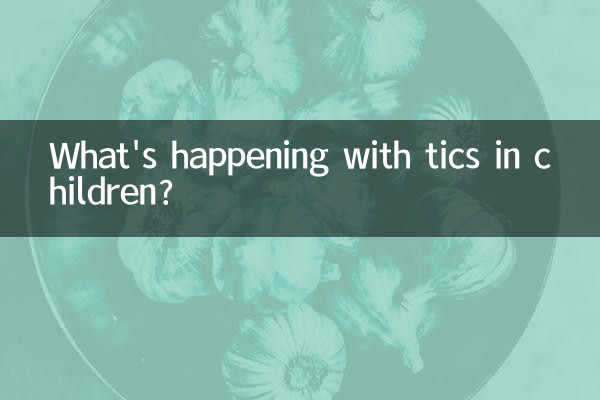What's happening with tics in children?
In recent years, childhood tics have become a hot topic of concern to parents and educators. As society pays more attention to children's mental health, there are more and more discussions related to tics. This article will combine the hot topics and hot content on the Internet in the past 10 days to provide you with a detailed analysis of the causes, symptoms, treatment and preventive measures of childhood tics.
1. What is childhood tics?

Tic Disorders in children is a neurodevelopmental disorder characterized by involuntary, repetitive, rapid movements or vocalizations. Tics usually develop in childhood and are more common in boys than girls. Depending on the duration and severity of symptoms, tics can be divided into transient tics, chronic tics, and Tourette Syndrome.
2. Common symptoms of tics in children
| Symptom type | Specific performance |
|---|---|
| motor tics | Blinking, frowning, shrugging, shaking head, kicking, etc. |
| vocal tics | Clearing throat, coughing, screaming, repeating words, etc. |
| complex tics | Jumping, touching objects, imitating other people’s actions, etc. |
3. Causes of tics in children
The specific cause of tics in children is not fully understood, but research suggests it may be related to the following factors:
| Influencing factors | Specific instructions |
|---|---|
| genetic factors | Children with a family history of tics are at higher risk |
| neurobiological factors | Abnormalities in neurotransmitters such as dopamine in the brain |
| environmental factors | Stress, anxiety, infection, etc. may induce or aggravate symptoms |
4. Treatment methods for tics in children
Currently, the treatment of childhood tics mainly uses comprehensive intervention measures, including:
| Treatment | Specific content |
|---|---|
| behavioral therapy | Habit reversal training, relaxation techniques, and more |
| drug treatment | Dopamine receptor blockers, α2 adrenergic agonists, etc. |
| psychological support | Understanding and support from family and school is crucial |
5. How to prevent tics in children?
Although tics cannot be completely prevented, parents can take the following steps to reduce their risk or symptoms:
1.Create a relaxing family environment: Reduces stress and anxiety in children.
2.Regular schedule: Make sure you get enough sleep and a healthy diet.
3.moderate exercise: Encourage children to participate in sports activities and release energy.
4.Seek medical attention promptly: Consult a professional doctor as soon as possible when you notice abnormal symptoms.
6. Social attention and support
Recently, discussions about childhood tics have continued to heat up on social media. Many parents have shared their experiences and called on society to give more understanding and tolerance to children with tics. Experts also emphasize that tics are not a child’s fault and should not be discriminated against or punished for.
Schools and teachers can support children with tics by:
- Allow children to move appropriately in class
- Avoid paying too much attention to their tics
- Educate other students to understand and accept
Conclusion
Tics in childhood are neurodevelopmental disorders that require long-term attention and management. Through scientific treatment and the understanding and support of the whole society, most children with tics can grow up healthily. If you find that your child has relevant symptoms, it is recommended to consult a professional doctor in time to obtain a personalized diagnosis and treatment plan.
Remember, love and understanding are the best medicine. Let us work together to create a more inclusive growth environment for children with tics.

check the details

check the details